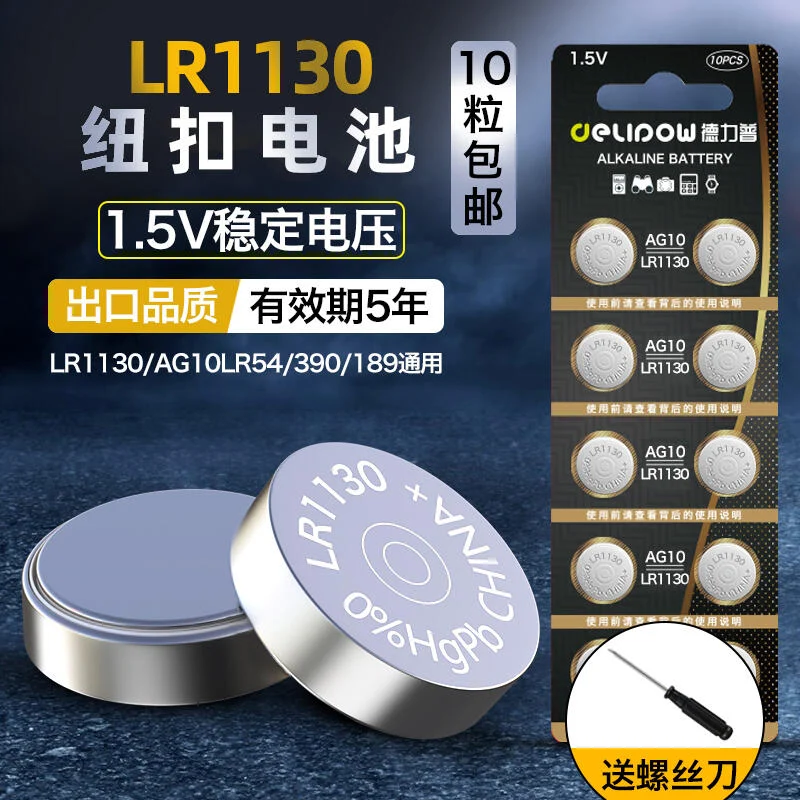the LR1131 battery which is commonly known as an LR54 battery, this is a small button cell battery often used in watches, calculators, and various small electronic devices.

Here are some general specifications for an LR1131 (LR54) battery:
Equivalent Names: LR1131 is also known as AG10, 189, L1131, D389, SG10, and others.
Chemistry: Alkaline
Voltage: 1.5 volts
Dimensions: Diameter: 11.6mm, Height: 3.1mm
LR1131 batteries are commonly used in small devices that require a compact power source. If you need further assistance or if you have a different type of 1131 battery in mind, please provide additional details or specifications for more accurate information.
Different Types of 1131 Batteries
-
LR1130 (LR54):
- Size: Button cell battery
- Voltage: Typically 1.5 volts
- Common Applications: Watches, calculators, small electronic devices
-
SR1130 (SR54):
- Size: Silver oxide button cell battery
- Voltage: Typically 1.55 volts
- Common Applications: Watches, medical devices, cameras
-
CR1130:
- Size: Lithium coin cell battery
- Voltage: Typically 3 volts
- Common Applications: Key fobs, small electronic devices
If you have more specific information or details regarding the "1131" batteries you are referring to, please provide additional context so that I can offer more tailored assistance or guidance.

Common Applications for 1131 Batteries
Watches, calculators, mini remote controls, key fobs, and other portable gadgets are common uses for the 1131 battery. It supplies these applications with a dependable and long-lasting power supply.
Factors to Consider when Choosing an 1131 Battery
-
Battery Size and Shape: Ensure that the physical dimensions of the 1131 battery match the requirements of your device. It should fit properly in the battery compartment without any issues.
-
Voltage: Check the voltage rating of the battery. Make sure it matches the voltage requirements of your device. Using a battery with the wrong voltage can damage your device.
-
Chemistry Type: Different battery chemistries (alkaline, lithium, etc.) offer various advantages in terms of performance, shelf life, and temperature stability. Choose the chemistry that best suits the needs of your device.
-
Capacity: Consider the capacity of the battery, typically measured in milliampere-hours (mAh). Higher capacity batteries last longer but may be larger or more expensive.
-
Brand and Quality: Opt for reputable battery brands known for their quality and reliability. Quality batteries are less likely to leak or cause damage to your device.
-
Usage Environment: If your device is exposed to extreme temperatures or high drain rates, select a battery that can perform well under those conditions.
-
Cost: Consider the cost of the battery, especially if you need to replace it frequently. Balance the initial cost with the battery's lifespan and performance.
-
Disposal and Environmental Impact: Check if the battery is rechargeable or disposable and consider the environmental impact of disposal. Rechargeable batteries are more eco-friendly in the long run.
-
Compatibility: Ensure that the 1131 battery you choose is compatible with your device. Check the manufacturer's recommendations to avoid any compatibility issues.
-
Availability: Make sure that the 1131 battery is readily available for purchase either online or at local stores to ensure you can easily replace it when needed.
By considering these factors and choosing the right battery for your device, you can optimize performance, longevity, and safety while using it. If you have more specific requirements or details about the 1131 battery you are referring to, please provide additional information for a more tailored recommendation.

How to Choose The Right 1131 Battery for Your Application
When choosing the right battery for your specific application, which in this case might be related to an "1131" battery type, consider the following steps to help guide your decision-making process:
-
Identify Your Device's Requirements:
- Determine the voltage and current requirements of your device. Ensure that the 1131 battery you choose meets these specifications.
-
Understand Size and Shape:
- Check the physical dimensions of the required battery to make sure it fits into your device without any issues.
-
Consider Battery Chemistry:
- Review the advantages and disadvantages of different battery chemistries (e.g., alkaline, lithium, silver oxide) and select the one that best suits your application based on factors such as lifespan, operating temperature range, and energy density.
-
Evaluate Capacity:
- Choose a battery with an appropriate capacity (measured in mAh) based on the power consumption requirements of your device and how often you plan to replace the battery.
-
Check Shelf Life:
- If your application requires long-term storage or occasional use, consider a battery with a long shelf life to ensure it remains usable when needed.
-
Assess Environmental Suitability:
- If your device operates in extreme temperatures or harsh environments, select a battery that can perform reliably under these conditions.
-
Review Brand Reputation:
- Opt for well-known and reputable battery brands to ensure quality, reliability, and safety.
-
Compare Costs:
- Balance the initial cost of the battery with its lifespan and performance to determine the most cost-effective option for your application.
-
Consider Rechargeable Options:
- If your application involves frequent battery replacements, consider using rechargeable batteries to reduce long-term costs and environmental impact.
-
Consult Manufacturer Recommendations:
- Refer to your device's user manual or contact the manufacturer to verify the recommended battery type for optimal performance.
- Purchase from Reliable Sources:
- Obtain batteries from trusted suppliers to ensure authenticity and quality.
- Test Compatibility:
- Before relying on the battery for critical operations, test its compatibility and performance in your device to ensure it functions as expected.
By following these steps and considering these factors, you can choose the right 1131 battery for your specific application, ensuring optimal performance, longevity, and reliability. If you have further details about your application or specific requirements, feel free to provide additional information for more tailored advice.
How to Storage 1131 Batteries Safely
Proper storage of batteries, including the 1131 batteries, is essential to maintain their performance and safety over time. Here are some guidelines on how to store 1131 batteries safely:
-
Store in a Cool, Dry Place: Store batteries in a cool, dry environment. Avoid exposure to direct sunlight, high temperatures, or high humidity, as extreme conditions can affect battery performance and lifespan.
-
Prevent Contact with Metal Objects: Store batteries away from metal objects, such as coins, keys, or other batteries, to prevent short circuits.
-
Avoid Extreme Temperatures: Do not store batteries in places with extreme temperatures, such as near heaters or in the freezer. High temperatures can lead to leakage or reduced capacity, while low temperatures can affect performance.
-
Keep Batteries in Their Original Packaging: If possible, store batteries in their original packaging or use a battery case to prevent contact with other objects and decrease the risk of short circuits.
-
Avoid Mixing Old and New Batteries: If storing used batteries with new ones, ensure they are separated to prevent potential issues, such as uneven discharge.
-
Store in a Safe Location: Keep batteries out of the reach of children and pets to prevent accidental ingestion or misuse.
-
Check Expiration Dates: If your batteries have an expiration date, ensure you use them before that date for optimal performance.
-
Avoid Mechanical Damage: Do not expose batteries to mechanical stress, such as bending, crushing, or puncturing, as this can lead to leakage or other safety hazards.
-
Rechargeable Batteries: For rechargeable 1131 batteries, store them partially charged (around 40-50%) if they will not be used for an extended period.
-
Dispose of Damaged Batteries: If you notice any damage, corrosion, leakage, or unusual odors coming from a battery, dispose of it properly following recommended procedures.
By following these storage guidelines, you can help ensure the safety and longevity of your 1131 batteries. Proper storage practices can also contribute to maintaining their performance when you are ready to use them in your devices.



